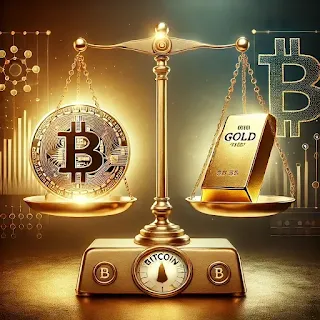In the ever-evolving landscape of finance and investment, two assets have captured the imagination of both traditional and modern investors: Bitcoin and Gold . While gold has been a symbol of wealth and stability for centuries, Bitcoin represents the new frontier of digital currency and decentralized finance. This article delves into the key differences and similarities between these two assets, offering a fresh perspective for the savvy investor.
1. Historical Background
Gold
Gold has a storied history dating back thousands of years. It has been used as a medium of exchange, a store of value, and a symbol of wealth and power. From ancient civilizations to modern times, gold has remained a coveted asset, revered for its rarity, durability, and universal acceptance.
Bitcoin
Bitcoin, on the other hand, is a relatively new phenomenon. Introduced in 2009 by the pseudonymous creator Satoshi Nakamoto , Bitcoin was designed as a decentralized digital currency that operates without the need for a central authority. Its creation marked the beginning of the cryptocurrency revolution, challenging traditional financial systems and offering an alternative form of investment.
2. Intrinsic Value
Gold
Gold's intrinsic value is derived from its physical properties and its historical role as a store of value. It is tangible, cannot be created out of thin air, and has multiple uses in industries such as jewelry, electronics, and medicine. Its value is also bolstered by the fact that it is a finite resource, with new gold discoveries becoming increasingly rare.
Bitcoin
Bitcoin, unlike gold, has no physical form. Its value is entirely digital, existing only as code on a decentralized ledger known as the blockchain . Bitcoin's value is largely driven by its scarcity (with a capped supply of 21 million coins), its utility as a medium of exchange, and the trust in its underlying technology. The concept of digital scarcity is unique to Bitcoin and other cryptocurrencies, making it a novel form of "digital gold."
3. Market Volatility
Gold
Gold is traditionally seen as a safe-haven asset, especially in times of economic uncertainty. Its price tends to be more stable compared to other assets, making it a reliable store of value. While gold can experience price fluctuations, these are generally less extreme compared to those seen in the cryptocurrency markets.
Bitcoin
Bitcoin is notorious for its volatility. Its price can experience dramatic swings in short periods, driven by factors such as regulatory news, technological developments, and market sentiment. For some investors, this volatility represents an opportunity for high returns, while for others, it is a risk that must be carefully managed.
4. Utility and Use Cases
Gold
Gold's utility extends beyond its role as a financial asset. It is widely used in various industries, including electronics, aerospace, and medicine, due to its unique physical properties such as conductivity and resistance to corrosion. Additionally, gold is a cultural and artistic symbol, often used in jewelry and artifacts.
Bitcoin
Bitcoin's primary utility lies in its ability to facilitate peer-to-peer transactions without the need for intermediaries. It is also increasingly seen as a hedge against inflation and a store of value, particularly in regions with unstable currencies. Beyond this, Bitcoin has inspired the creation of a vast ecosystem of digital assets and decentralized applications, further expanding its use cases.
5. Accessibility and Ownership
Gold
Owning gold typically requires physical possession or investment through financial instruments such as ETFs, futures, or gold mining stocks. Storing physical gold can be costly and requires secure facilities. Furthermore, the process of buying and selling gold can involve significant premiums and transaction fees.
Bitcoin
Bitcoin, being entirely digital, offers a different kind of accessibility. It can be bought, sold, and stored easily through digital wallets, with transactions taking place on the blockchain. Ownership is verified through cryptographic keys, and transactions can be made quickly and with relatively low fees compared to traditional financial systems. Bitcoin's divisibility also allows for fractional ownership, making it accessible to a broader range of investors.
6. Regulatory Environment
Gold
Gold has long been integrated into the global financial system, with well-established regulations governing its trade, storage, and taxation. Its status as a physical asset also means that it is less susceptible to government interference compared to digital currencies.
Bitcoin
Bitcoin operates in a more complex regulatory environment. As a digital asset, it faces varying degrees of acceptance and regulation across different jurisdictions. Some countries embrace Bitcoin as a legitimate currency, while others impose strict regulations or outright bans. The evolving nature of cryptocurrency regulation adds an additional layer of risk and uncertainty for Bitcoin investors.
7. Future Outlook
Gold
Gold's future seems secure, continuing to play its role as a store of value and an industrial commodity. However, its growth potential may be limited compared to newer assets like Bitcoin. Gold will likely remain a cornerstone of traditional investment portfolios, especially for those seeking stability.
Bitcoin
Bitcoin's future is more speculative, with potential for both significant growth and substantial risk. As more institutions and individuals adopt Bitcoin, its legitimacy as a store of value and medium of exchange may solidify. However, the road ahead is fraught with challenges, including regulatory hurdles, technological risks, and market competition.
While both Bitcoin and gold offer unique advantages, they cater to different types of investors. Gold is the tried-and-true asset, offering stability and physical presence. Bitcoin, on the other hand, represents innovation and the potential for high returns, albeit with greater risk.
As the financial landscape continues to evolve, the choice between Bitcoin and gold will depend on individual investment goals, risk tolerance, and beliefs about the future of money. Whether you're a traditionalist favoring the security of gold or a modernist intrigued by the promise of Bitcoin, understanding the strengths and weaknesses of each asset is crucial for making informed investment decisions.


.webp)